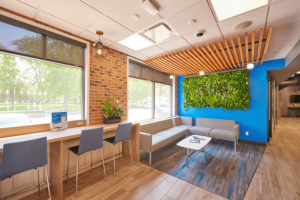In an era where environmental consciousness is at the forefront of global concerns, the hospitality industry is embracing sustainable design practices to minimize its environmental impact while appealing to eco-conscious guests. From green materials to energy-saving technologies, hotels are adopting innovative solutions to create more sustainable and environmentally friendly spaces.

Health and Energy-Saving Technologies
One of the most significant trends in sustainable hotel design is the integration of health and energy-saving technologies. Hotels are implementing rooms equipped with motion sensors and automatic water stops to minimize water wastage. Innovative air purification systems and water filters ensure a healthier environment for guests, while circadian rhythm dimmers contribute to improved sleep quality. These technologies not only demonstrate a commitment to smart consumption but also prioritize guest comfort and well-being.
Material Choice Matters
Hotel owners concerned with sustainability tend to opt for high-quality finishing materials, with a preference for natural and eco-friendly options. Certified products that meet established eco-standards are becoming the norm, including natural wood elements and large-scale stoneware as leading options. These materials not only add a touch of luxury to hotel interiors but also contribute to a more sustainable and environmentally friendly design aesthetic.
Eco Decor
Eco-friendly decor elements have become another key aspect of sustainable hotel design. Green plants are being used extensively to enhance hotel interiors, from traditional potted plants to living walls adorned with greenery and moss. Not only do these elements add a touch of nature to the space, but they also improve indoor air quality and create a sense of tranquility for guests.
Integration of Sustainable Technologies in Architecture and Design
Looking ahead, the integration of sustainable technologies will continue to play a pivotal role in hotel architecture. Green roofs, complete with live vegetation, can help improve insulation and reduce energy consumption. Photovoltaic panels sharness solar energy to power the building, while rainwater harvesting systems collect and reuse water for irrigation purposes, minimizing waste. Smart lighting systems adjust based on occupancy or natural light availability, further conserving energy and reducing carbon emissions.
In addition to sustainable design practices, hotels are embracing technology to enhance sustainability efforts. For example, facial recognition technology can be implemented to offer a secure and simple check-in process. Additionally, smart room controls empower guests to manage air temperatures within limits, easily adjust lighting, and contact housekeeping staff through modern mobile applications or voice command interfaces.

Prepare and Look Forward
As the hospitality industry continues to prioritize sustainability, innovative design practices are playing a crucial role in creating more environmentally friendly and socially responsible spaces. From integrating green materials and energy-saving technologies to embracing eco-friendly decor elements, hotels are reimagining their spaces to minimize their environmental footprint while providing a memorable experience for guests.
To explore innovations in sustainable design and create a greener future for your hospitality establishment, talk to the design experts at NewGround. With our expertise in sustainable design practices, we can help you create a space that not only delights guests but also supports a more sustainable and environmentally friendly future. Contact us today to learn more.
